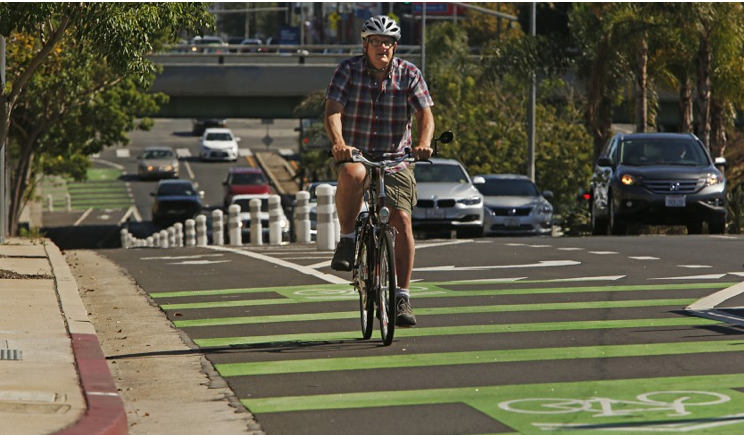CommentsTRANSIT LA--An insert into my recent home delivery of Los Angeles Times was the Fall 2019 issue of Mobility Road | Rail |Transit, from the folks we entrust for our mobility around Southern California: Metro. It is a large sheet, folded, glossy paper, full color, two-sided, twenty-four-page pamphlet telling, what?
(Photo above from Mobility Road publication.)
There are articles on construction projects for Metro Rail, Metro Bus, Caltrans, and Foothill Transit. All of this is fine, but do those projects warrant what looks like a fairly expensive publication, paid by taxpayer money? As a transit advocate, I support trains and buses, but at taxpayer expense why was this published?
Does Metro need to list the current projects paid for by voter and California legislature approved expenditures for transit and road construction? If so, why is there a lengthy article on Route 66? While nostalgic, this route does not have much bearing on the tremendous pollution generating soul crushing gridlock we in SoCal suffer.
Missing were articles stating the case for more buses running more frequently and with longer hours of operation to help transit riders, and maybe entice car drivers to try Metro. There was no stating the case for the need for Metro to continue to expand its light rail and subway network-and more on that later.
Rail projects are mentioned. They are in the eastern parts of Los Angeles County, and while notable and needed, and projects I support, in the pamphlet there is no mention of the critical Downtown Connector to connect the Blue (now the A Line) Expo and Gold Lines to avoid transfers between these trains so riders can travel from Long Beach to Azusa, or East Los Angeles to Santa Monica without leaving the train - a one seat ride. There is scant reference to the soon to be operating Crenshaw Line.
The Downtown Connector and Crenshaw Line are in highly populated urban centers and will carry a great number of passengers far exceeding the ridership of the Gold Line from the less populated area between the Glendora and Montclair Stations. Why are they neglected in this pamphlet?
And why is there nothing to assist current and potential riders of Metro trains and buses? There are no instructions on how to ride buses and trains and navigate the transit system in the Los Angeles sprawl.
I am a transit rider, regularly riding buses and trains since 1992, and I am constantly confused on how to navigate the system. There is no information on how to pay to ride. There is no information on what major points of interest, entertainment venues, business and commerce centers, districts and unique centers, and sports venues which can be reached riding transit. Other than building, what does Metro do?
If Metro is serious about getting people out of their cars and into buses and trains, Metro must educate Southern California on how to ride transit.
Missing was Metro supporting its riders.
This self-congratulating pamphlet is better suited for in-house publication at Metro. If they are spending this amount money for this glossy act self-congratulations for the public, what are they spending for true in-house publications?
If Metro wanted to inform Southern California about its projects, fine, it is good to see how the public’s money is spent, but it could have been done with less cost which would show Metro is being a good steward with the public’s money, but with this glossy pamphlet questions arise on how wisely they are spending our money.
(Matthew Hetz is a Los Angeles native. He is a transit rider and advocate, a composer, music instructor, and member and president and executive director of the Culver City Symphony Orchestra. He is a CityWatch contributor.)
-cw
















